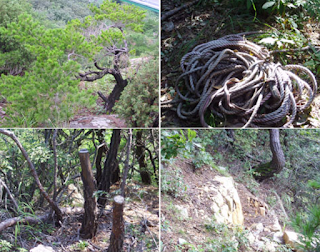Environmental Crisis Unveiled: The Dark Side of Yeosu's Forest Management
Controversial Tree Harvesting Sparks Outcry Amidst Environmental Conservation Goals
The recent scenes of rampant tree felling, reminiscent of a clear-cutting operation, have shocked observers and environmentalists alike. With majestic 50cm-diameter hackberry trees uprooted and sprawling forests transformed into desolate landscapes, the Forest Service's harsh verdict on 'aging' trees has stirred controversy. This article explores the unsettling reality of mass deforestation, revealing the clash between environmental conservation, government policies, and local livelihoods.
I. The Shocking Scenes of Mass Tree Harvesting Desolation in the Name of Carbon Neutrality
The picturesque landscapes of Yeosu witness the unsettling aftermath of mass tree harvesting, where centuries-old hackberry trees, deemed 'too old' to effectively absorb carbon, are mercilessly uprooted. The indiscriminate logging practices, depicted as reminiscent of refugee camp children's gaunt rib cages, leave behind grotesque traces on the once-lush mountainside.
II. The Government's Carbon Neutrality Strategy A Controversial Plan to Uproot 'Aging' Trees
The Forest Service's '2050 Carbon Neutrality Initiative,' unveiled in January, adds to the dismay. Proposing to clear-cut 90,000 hectares of forest, approximately 38% of the designated economic forestland, over the next 30 years, the plan aims to replace 'aging' hackberry trees with 3 billion young trees. This strategy, claiming to reduce 34 million tons of carbon emissions, raises eyebrows and opposition.
III. Backlash from Environmentalists and Locals Protests Against Insensitive Management Practices
As scenes of mass tree harvesting come to light, environmental activists, local residents, and concerned citizens voice their dissent. Accusations of the Forest Service neglecting species diversity, ecological considerations, and community input fuel the controversy. Criticisms intensify as environmental organizations and the media denounce the Forest Service's insensitivity to historical narratives and local beliefs.
IV. Reckless Policies: The Impact on Forest Ecosystems Alarming Deforestation and the Consequences of Hasty Decisions
Examining the data reveals alarming figures, with 106,000 hectares of forest disappearing in the past five years. The analysis suggests a correlation between reckless policies, driven by the government's push for carbon neutrality and renewable energy sources, and a surge in deforestation. The toll on forests for solar panel installations, highlighted as a major contributor, prompts serious concerns about the government's environmental stewardship.
V. Reevaluation of Carbon Neutrality Strategies Environmental Agencies Under Scrutiny
In the wake of public backlash, the Ministry of Environment announces a reevaluation of the Forest Service's carbon neutrality plan. The article questions the credibility of the Forest Service and Forest Research Institute, urging them to reconsider their forest management strategies. Calls for an approach that prioritizes ecological diversity and acknowledges the social, cultural, and economic aspects of forestry management are emphasized.
Conclusion: The unfolding controversy exposes the pitfalls of a bureaucratic approach to forest management and carbon neutrality. Balancing economic interests with ecological preservation and community welfare is a delicate task that demands a reevaluation of existing policies. As Yeosu grapples with the aftermath of mass tree harvesting, the article concludes by advocating for a comprehensive and considerate ecological management approach that ensures the sustainable future of its forests.
#YeosuForestControversy, #MassTreeHarvesting, #CarbonNeutrality, #EnvironmentalConservation, #ForestManagement, #GovernmentPolicies #CommunityOutcry

